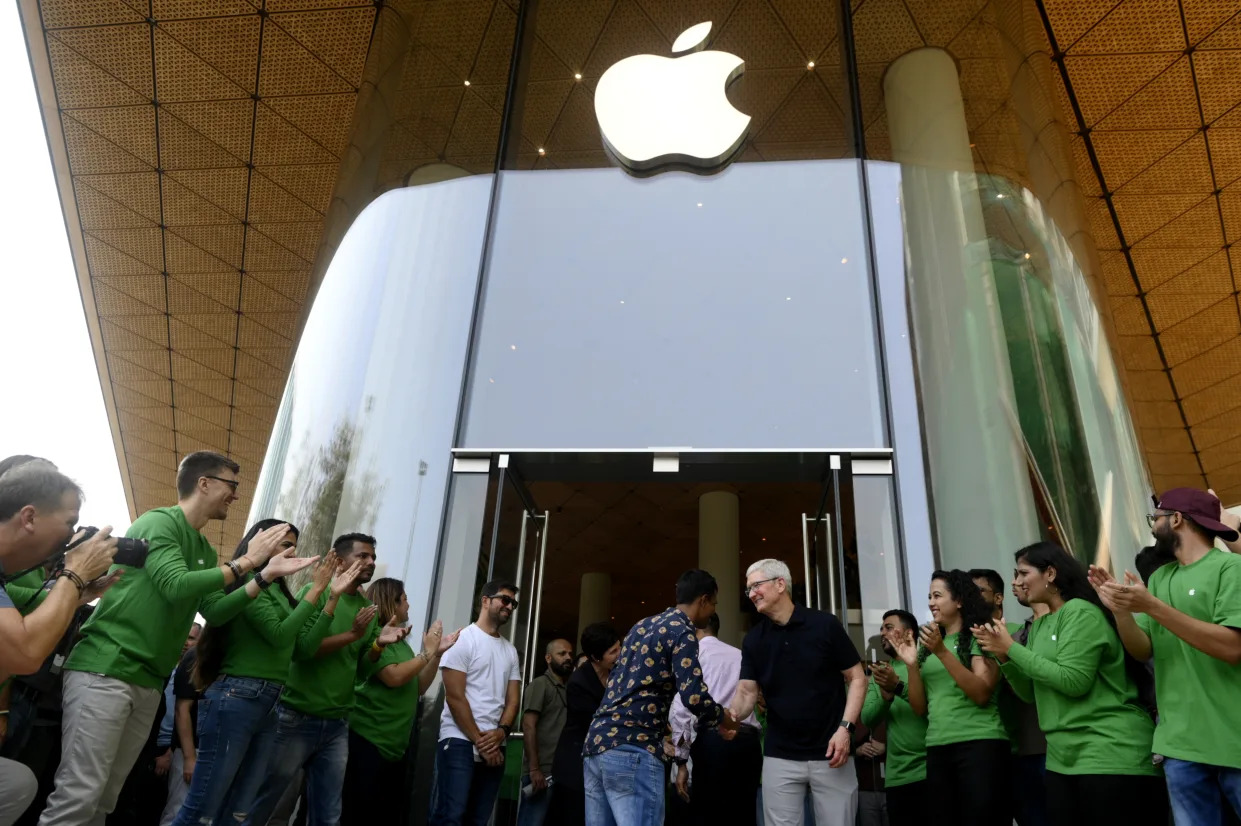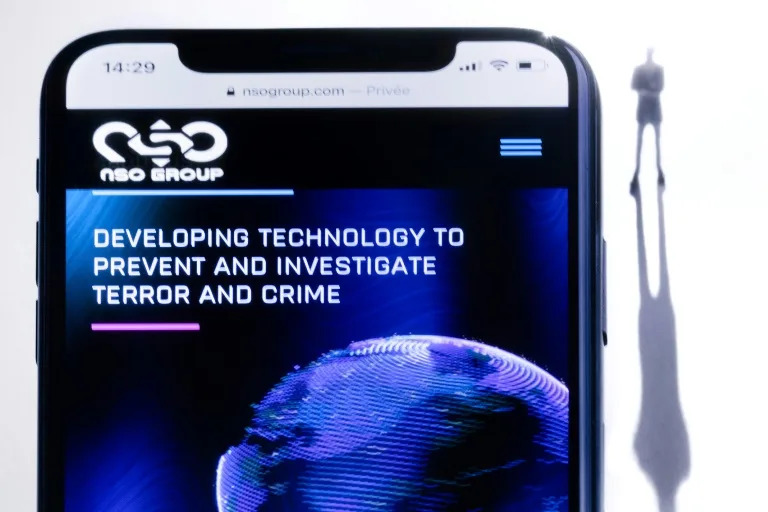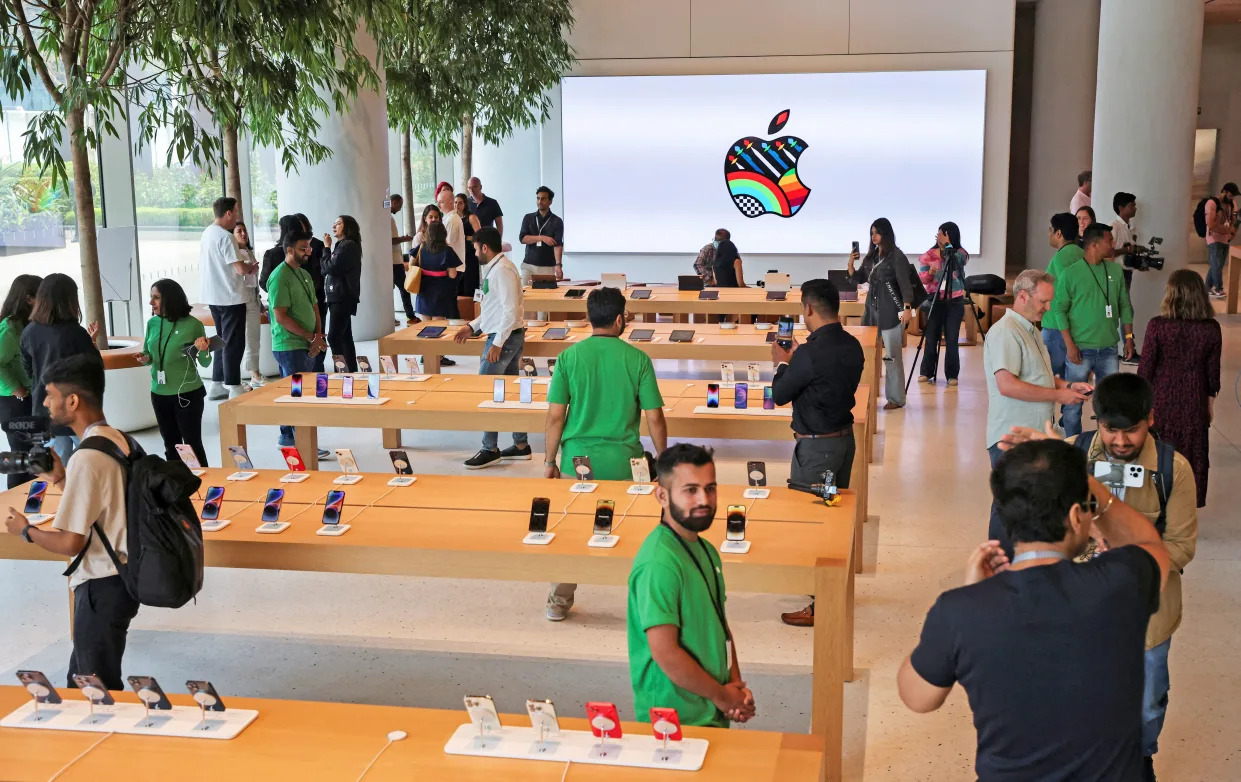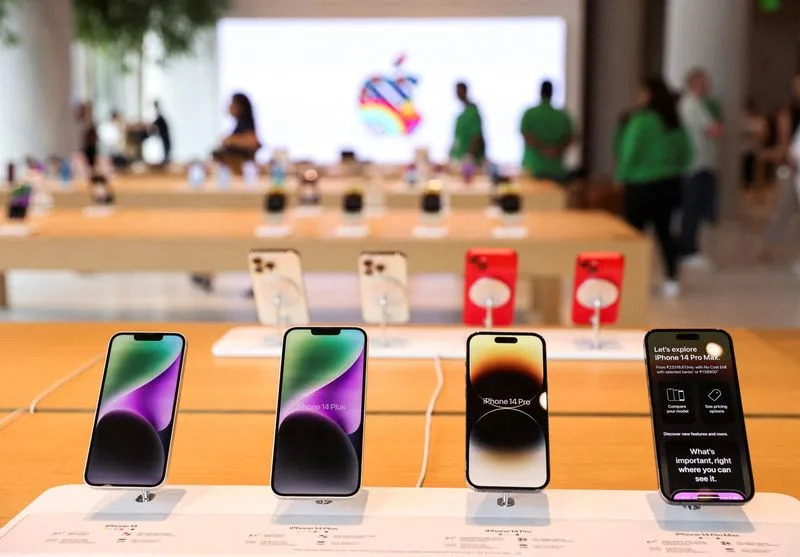UPDATED
Amnesty confirms Apple warning: Indian journalists' iPhones infected with Pegasus spywareManish Singh
Updated Thu, December 28, 2023

Apple's warnings in late October that Indian journalists and opposition figures may have been targeted by state-sponsored attacks prompted a forceful counterattack from Prime Minister Narendra Modi's government. Officials publicly doubted Apple's findings and announced a probe into device security.
India has never confirmed nor denied using the Pegasus tool, but nonprofit advocacy group Amnesty International reported Thursday that it found NSO Group's invasive spyware on the iPhones of prominent journalists in India, lending more credibility to Apple's early warnings.
“Our latest findings show that increasingly, journalists in India face the threat of unlawful surveillance simply for doing their jobs, alongside other tools of repression including imprisonment under draconian laws, smear campaigns, harassment, and intimidation,” said Donncha Ó Cearbhaill,hHead of Amnesty International’s Security Lab, in the blog post.
“Despite repeated revelations, there has been a shameful lack of accountability about the use of Pegasus spyware in India which only intensifies the sense of impunity over these human rights violations.”
The Washington Post separately reported Thursday that Apple faced heat from senior officials from Modi's administration, who behind closed doors, earlier demanded Apple soften the political impact of the warnings. Senior officials summoned Apple representatives to insist they provide alternative explanations, even flying in an Apple security expert to meet with ministry leaders, the report adds.
The pressure campaign by Indian officials to soften the impact of the warnings disturbed Apple executives in California but achieved limited results, The Washington Post added. While Apple India officials initially helped cast doubt on the alerts -- issuing a statement that in part said it was possible some notifications may be false alarms -- the company issued no follow-up statement placating authorities after the expert's visit.
The report adds:
The recent episode also exemplified the dangers facing government critics in India and the lengths to which the Modi administration will go to deflect suspicions that it has engaged in hacking against its perceived enemies, according to digital rights groups, industry workers and Indian journalists.
Many of the more than 20 people who received Apple’s warnings at the end of October have been publicly critical of Modi or his longtime ally, Gautam Adani, an Indian energy and infrastructure tycoon. They included a firebrand politician from West Bengal state, a Communist leader from southern India and a New Delhi-based spokesman for the nation’s largest opposition party.
For Apple, maintaining its commitment to user security took priority over risks to its growing India business. Apple, which opened two official stores in India this year, plans to move 25% of iPhone production to India by 2025, according to JP Morgan analysts. But the showdown revealed Modi's willingness to turn the screws on Big Tech.
India targeting high-profile journalists with spyware: Amnesty
AFP
Wed, December 27, 2023

Created by Israeli firm NSO Group and sold to governments around the world, Pegasus software can be used to access a phone's messages and emails, peruse photos, eavesdrop on calls, track locations and even film the owner with the camera (JOEL SAGET)
India's government has recently targeted high-profile journalists with Pegasus spyware, Amnesty International and The Washington Post said in a joint investigation published Thursday.
Created by Israeli firm NSO Group and sold to governments around the world, Pegasus software can be used to access a phone's messages and emails, peruse photos, eavesdrop on calls, track locations and even film the owner with the camera.
Amnesty said journalists Siddharth Varadarajan of The Wire and Anand Mangnale of The Organized Crime and Corruption Reporting Project had been targeted with the spyware on their iPhones, with the latest identified case occurring in October.
"Our latest findings show that increasingly, journalists in India face the threat of unlawful surveillance simply for doing their jobs, alongside other tools of repression including imprisonment under draconian laws, smear campaigns, harassment, and intimidation," said Donncha O Cearbhaill, Head of Amnesty International's Security Lab.
India's government did not immediately respond, but it denied similar accusations in 2021 that it used Pegasus spyware to surveil political opponents, activists and journalists.
Indian media reported last month that the country's cyber security unit was investigating allegations by opposition politicians of attempted phone tapping after they reported receiving Apple iPhone warnings of "state-sponsored attackers".
In that case, Ashwini Vaishnaw, the information and technology minister, said the government was "concerned" by the complaints.
Indian government pressed Apple to soften hacking warning: Report
Julia Shapero
THE HILL
Thu, December 28, 2023

The Indian government privately pressed Apple officials to soften their warnings to Indian journalists and opposition politicians that state-sponsored attackers could be targeting their phones, according to The Washington Post.
Senior officials in Indian Prime Minister Narendra Modi’s administration reportedly called Apple India’s managing director, Virat Bhatia, after reports emerged about the notifications in late October and asked the tech giant to withdraw the warnings.
Soon after, Apple India sent out emails saying the notifications are based on “threat intelligence signals that are often imperfect and incomplete” and began privately asking Indian tech journalists to note the warnings could be false alarms and had been issued to users in 150 countries, the Post reported.
A memo from the ruling Bharatiya Janata Party (BJP) similarly noted users in other countries received notifications and that Apple’s systems contained vulnerabilities, according to the Post.
Government officials also told Indian news outlets they suspected the warnings were the result of an “algorithmic malfunction,” and the deputy minister of electronics and information technology announced a probe into the notifications.
In November, an Apple security official from outside India reportedly flew to New Delhi to meet with government officials and defended the company’s work, according to the Post.
Many of the people who received Apple’s warnings in late October had been critical of Modi or Indian energy and infrastructure tycoon Gautam Adani and his relationship with the Indian prime minister, the Post noted.
Journalist Anand Mangnale reached out to Adani for comment in late August on a story alleging his associates secretly traded in the Adani Group’s public stock in potential violation of Indian securities law.
Mangnale had Pegasus spyware planted on his phone within 24 hours of the inquiry, according to a forensic analysis of his phone conducted by Amnesty International and reported by the Post.
Mahua Moitra, a former member of Parliament who criticized Modi’s relationship with Adani, also received a warning from Apple in late October. An examination of her phone by the security firm iVerify also indicated it had been hacked, according to the Post.
Moitra was expelled from Parliament in December over allegations that she was receiving bribes from a business rival of Adani’s to ask questions about his relationship with the prime minister. She has denied the accusations.
Apple reportedly faces pressure in India after sending out warnings of state-sponsored hacking
India's government is 'really angry' at Apple for warning its known critics, The Washington Post says.
Mariella Moon
·Contributing Reporter
Thu, December 28, 2023

The Indian government privately pressed Apple officials to soften their warnings to Indian journalists and opposition politicians that state-sponsored attackers could be targeting their phones, according to The Washington Post.
Senior officials in Indian Prime Minister Narendra Modi’s administration reportedly called Apple India’s managing director, Virat Bhatia, after reports emerged about the notifications in late October and asked the tech giant to withdraw the warnings.
Soon after, Apple India sent out emails saying the notifications are based on “threat intelligence signals that are often imperfect and incomplete” and began privately asking Indian tech journalists to note the warnings could be false alarms and had been issued to users in 150 countries, the Post reported.
A memo from the ruling Bharatiya Janata Party (BJP) similarly noted users in other countries received notifications and that Apple’s systems contained vulnerabilities, according to the Post.
Government officials also told Indian news outlets they suspected the warnings were the result of an “algorithmic malfunction,” and the deputy minister of electronics and information technology announced a probe into the notifications.
In November, an Apple security official from outside India reportedly flew to New Delhi to meet with government officials and defended the company’s work, according to the Post.
Many of the people who received Apple’s warnings in late October had been critical of Modi or Indian energy and infrastructure tycoon Gautam Adani and his relationship with the Indian prime minister, the Post noted.
Journalist Anand Mangnale reached out to Adani for comment in late August on a story alleging his associates secretly traded in the Adani Group’s public stock in potential violation of Indian securities law.
Mangnale had Pegasus spyware planted on his phone within 24 hours of the inquiry, according to a forensic analysis of his phone conducted by Amnesty International and reported by the Post.
Mahua Moitra, a former member of Parliament who criticized Modi’s relationship with Adani, also received a warning from Apple in late October. An examination of her phone by the security firm iVerify also indicated it had been hacked, according to the Post.
Moitra was expelled from Parliament in December over allegations that she was receiving bribes from a business rival of Adani’s to ask questions about his relationship with the prime minister. She has denied the accusations.
Apple reportedly faces pressure in India after sending out warnings of state-sponsored hacking
India's government is 'really angry' at Apple for warning its known critics, The Washington Post says.
Mariella Moon
·Contributing Reporter
ENDGADGET
Thu, December 28, 2023

REUTERS/Francis Mascarenhas
Indian authorities allied with Prime Minister Narendra Modi have questioned Apple on the accuracy of its internal threat algorithms and are now investigating the security of its devices, according to The Washington Post. Officials apparently targeted the company after it warned journalists and opposition politicians that state-sponsored hackers may have infiltrated their devices back in October. While Apple is under scrutiny for its security measures in the eyes of the public, the Post says government officials were more upfront with what they wanted behind closed doors.
They reportedly called up the company's representatives in India to pressure Apple into finding a way to soften the political impact of its hacking warnings. The officials also called in an Apple security expert to conjure alternative explanations for the warnings that they could tell people — most likely one that doesn't point to the government as the possible culprit.
The journalists and politicians who posted about Apple's warnings on social media had one thing in common: They were all critical of Modi's government. Amnesty International examined the phone of one particular journalist named Anand Mangnale who was investigating long-time Modi ally Gautam Adani and found that an attacker had planted the Pegasus spyware on his Apple device. While Apple didn't explicitly say that the Indian government is to blame for the attacks, Pegasus, developed by the Israeli company NSO Group, is mostly sold to governments and government agencies.
The Post's report said India's ruling political party has never confirmed or denied using Pegasus to spy on journalists and political opponents, but this is far from the first time its critics have been infected with the Pegasus spyware. In 2021, an investigation by several publications that brought the Pegasus project to light found the spyware on the phones of people with a history of opposing and criticizing Modi's government.
India's govt demanded Apple soften impact of hack warnings -Washington Post
Reuters
Wed, December 27, 2023

Apple iPhones are seen inside India's first Apple retail store, a day ahead of its launch, in Mumbai
(Reuters) - Apple's warnings in October to Indian opposition politicians that government hackers may have hacked their phones prompted Prime Minister Narendra Modi's administration to quickly demand the U.S. firm soften its message, the Washington Post reported.
Apple's India representatives were called by administration officials who demanded that company help weaken the political impact of the warnings, the newspaper said citing three unidentified sources.
An Apple security expert was also summoned from outside the country to a meeting in New Delhi and the expert was pressed to come up with alternative explanations for the warnings, it said.
Apple and India's Ministry of Electronics and Information did not immediately respond to a request for comment.
The Indian opposition has accused Modi's government of trying to hack the phones of senior opposition politicians who said they had received warning messages from Apple.
At the time, some of the lawmakers shared screenshots on social media of a notification quoting the iPhone manufacturer as saying: "Apple believes you are being targeted by state-sponsored attackers who are trying to remotely compromise the iPhone associated with your Apple ID".
Apple has previously said it did not attribute the threat notifications to "any specific state-sponsored attacker".
(Reporting by Chandni Shah and Baranjot Kaur in Bengaluru; Editing by Edwina Gibbs)
Thu, December 28, 2023
REUTERS/Francis Mascarenhas
Indian authorities allied with Prime Minister Narendra Modi have questioned Apple on the accuracy of its internal threat algorithms and are now investigating the security of its devices, according to The Washington Post. Officials apparently targeted the company after it warned journalists and opposition politicians that state-sponsored hackers may have infiltrated their devices back in October. While Apple is under scrutiny for its security measures in the eyes of the public, the Post says government officials were more upfront with what they wanted behind closed doors.
They reportedly called up the company's representatives in India to pressure Apple into finding a way to soften the political impact of its hacking warnings. The officials also called in an Apple security expert to conjure alternative explanations for the warnings that they could tell people — most likely one that doesn't point to the government as the possible culprit.
The journalists and politicians who posted about Apple's warnings on social media had one thing in common: They were all critical of Modi's government. Amnesty International examined the phone of one particular journalist named Anand Mangnale who was investigating long-time Modi ally Gautam Adani and found that an attacker had planted the Pegasus spyware on his Apple device. While Apple didn't explicitly say that the Indian government is to blame for the attacks, Pegasus, developed by the Israeli company NSO Group, is mostly sold to governments and government agencies.
The Post's report said India's ruling political party has never confirmed or denied using Pegasus to spy on journalists and political opponents, but this is far from the first time its critics have been infected with the Pegasus spyware. In 2021, an investigation by several publications that brought the Pegasus project to light found the spyware on the phones of people with a history of opposing and criticizing Modi's government.
India's govt demanded Apple soften impact of hack warnings -Washington Post
Reuters
Wed, December 27, 2023

Apple iPhones are seen inside India's first Apple retail store, a day ahead of its launch, in Mumbai
(Reuters) - Apple's warnings in October to Indian opposition politicians that government hackers may have hacked their phones prompted Prime Minister Narendra Modi's administration to quickly demand the U.S. firm soften its message, the Washington Post reported.
Apple's India representatives were called by administration officials who demanded that company help weaken the political impact of the warnings, the newspaper said citing three unidentified sources.
An Apple security expert was also summoned from outside the country to a meeting in New Delhi and the expert was pressed to come up with alternative explanations for the warnings, it said.
Apple and India's Ministry of Electronics and Information did not immediately respond to a request for comment.
The Indian opposition has accused Modi's government of trying to hack the phones of senior opposition politicians who said they had received warning messages from Apple.
At the time, some of the lawmakers shared screenshots on social media of a notification quoting the iPhone manufacturer as saying: "Apple believes you are being targeted by state-sponsored attackers who are trying to remotely compromise the iPhone associated with your Apple ID".
Apple has previously said it did not attribute the threat notifications to "any specific state-sponsored attacker".
(Reporting by Chandni Shah and Baranjot Kaur in Bengaluru; Editing by Edwina Gibbs)
No comments:
Post a Comment